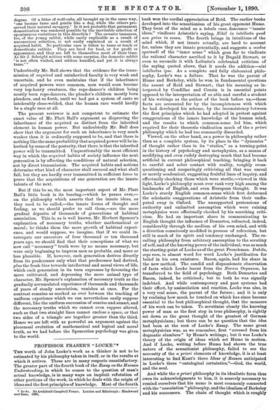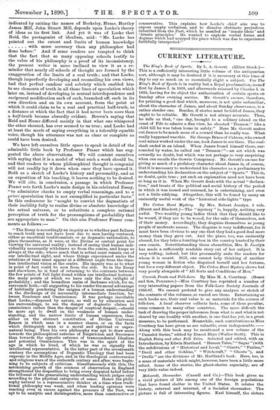PROFESSOR FRASER'S " LOCKE."
THE worth of John Locke's work as a thinker is not to be estimated by his philosophy taken in itself, or in the results at which it arrives. These are in many respects unsatisfactory. The greater part of the fourth book of the Essay on the Human Understanding, in which he comes to the question of man's actual knowledge, is in many ways an implicit refutation of other portions of the work, in which he deals with the origin of ideas and the first principles of knowledge. Most of the fourth • Locke. By Archibald Campbell Fraser. London and Edinburgh : Blackwood and pons. 1890. book won the cordial appreciation of Reid. The earlier books developed into the sensationism of his great opponent Hume. They treat of the mind as a tabula rasa, denounce "innate ideas," vindicate Aristotle's saying, Nihil in intellectu quad non pries in sensu. The fourth brings in intuitions of the mind which, if not innate actually, are hard to account for, unless they are innate potentially, and suggests a modus operandi of the "inner sense" which goes far to vindicate the rational character ascribed to it by Dtigald Stewart, or even to reconcile it with Leibnitz's celebrated. criticism of the saying quoted above, that it needs the addition—nisi intellectus ipse. As a complete and fully elaborated philo- sophy, Locke's was a failure. That he was the parent of Hume and Berkeley, while he won in fundamental questions the assent of Reid and Stewart; that his meaning as in- terpreted by Condillac and Cousin is in essential points opposed to the interpretation of so able and careful a student of his writings as the author of the book before us,—these facts are accounted for by the incompleteness with which he had developed his scheme, by the inconsistency between the first principles which he had adopted in protest against exaggerations of the innate knowledge of the human mind, and the results to which common-sense led him, which required for their theoretic vindication much of the a priori philosophy which he had too summarily discarded.
Viewed, on the other hand, as a power in philosophy rather than as a complete system, by its place in the " dynamics " of thought rather than in its " statics," as a turning-point in the history of psychology and metaphysics,, as a means of modifying and even rudely destroying much that had become artificial in current philosophical teaching, bringing it back to careful and sober contact with reality, roughly cross- questioning and unsparingly criticising all that was unreal or merely academical, suggesting fruitful lines of inquiry, and effectually checking those which were sterile,—viewed in this light, Locke's philosophy must ever rank very high among the landmarks of English, and even European thought. It was Locke's sturdy English common-sense which first dethroned the scholastic exaggerations of Aristotle from their undis- puted sway in Oxford. The unsupported pretensions of authority and unlimited assumption which were ruining metaphysics were effectually checked by his searching criti- cism. He had an important share in communicating to English thought the influence of Descartes, refracted, indeed, considerably through the medium of his own mind, and with a direction consciously modified in process of refraction, but still in much of its spirit and tendency unchanged. The re- calling philosophy from arbitrary assumption to the scrutiny of self, and of the knowing power of the individual, was as much the starting-point of Locke as of the great Frenchman. Dubito, ergc sum, is almost word for word Locke's justification for belief in his own existence. Bacon, again, had his share in the new method. The candid and dispassionate observation of facts which Locke learnt from the Novura Organum, he transferred to the field of psychology. Both Descartes and Bacon, indeed, he criticised ; but to both he was signally indebted. And while contemporary and past systems had their effect, by assimulation and reaction, Locke was also, in a very real sense, the parent of the future ; and it is only by realising how much he touched on which has since become essential to the best philosophical thought, that the measure of his work can be taken. To scrutinise closely the knowing power of man as the first step in true philosophy, is rightly set down as the great thought of the greatest of German metaphysicians ; but there can be no question that the idea had been at the root of Locke's Essay. The same great metaphysician was, as we remember, first "aroused from his dogmatic slumbers" by Hume's writings ; but it was Locke's theory of the origin of ideas which set Hume in motion. And if Locke, writing before Hume had shown the true nature of the sensationist philosophy, failed to see the necessity of the a priori elements of knowledge, it is at least interesting to find Kant's three Ideas of. Reason anticipated in . Locke's three "ontological certainties,"—God, the world, and the soul.
And while the a priori philosophy in its idealistic form thus owes its acknowledgments to him, it is scarcely necessary to remind ourselves that his name is most commonly connected with the "association " philosophy, and the idealism of Berkeley and his successors. The chain of thought which is roughly
indicated by uniting the names of Berkeley, Hume, Hartley James Mill, John Stuart Mill, depends upon Locke's theory of ideas as its first link. And yet it was of Locke that Reid, the protagonist of idealism, said : " Mr. Locke has pointed out the extent and limits of human knowledge
with more accuracy than any philosopher had done before." And if some readers are tempted to think that the fact that so many opposing schools testify to the value of his philosophy is a proof of its inconsistency, the present writer is more inclined to view it as a re- minder that nearly all schools of thought are formed by the exaggeration of the limits of a real truth ; and that Locke, though imperfectly developing and reconciling his own views, had that perfect candour and sobriety which enabled him to see elements of truth in all those lines of speculation which later on, instead of developing in mutual interdependence and reciprocal modification each of each, branched off, each in its own direction and on its own account, from the point at which it could claim to be a real and practical half-truth, to a distance at which the fact that it had never been more than a half-truth became absurdly evident. Brown's saying that Reid and Hume differed mainly in that what one whispered the other shouted, has ever seemed to us true ; and Locke had at least the merit of saying everything in a tolerably equable voice, though his utterance was not as clear or complete as could have been desired.
We have left ourselves little space to speak in detail of the admirable little book by Professor Fraser which has sug- gested the above observations. We will content ourselves with saying that it is a model of what such a work should be, and that readers to whom philosophical thought is congenial will not readily lay it down when once they have opened it. Both as a sketch of Locke's history and personality, and as an exposition of his teaching, it leaves nothing to be desired. We will cite, in conclusion, a passage in which Professor Fraser sets forth Locke's main design in his celebrated Essay, "to administer checks to empty verbal reasonings, and to a priori speculation that is not exemplified in particular facts?' In this endeavour he " sought to convict the dogmatists of their inability fully to realise divine or absolute knowledge of the actual universe, or to substitute a complete rational perception of truth for the presumptions of probability that are appropriate to man." On this aim Professor Fraser com- ments as follows :- " The Essay is accordingly an inquiry as to whether past failures to reach truth may not have been due to men having ventured, either as uncritical traditionalists or as dogmatic rationalists, to place themselves, as it were, at the Divine or central point for viewing the universal reality; instead of seeing that human indi- viduality necessarily withdraws us from the centre, and keeps us always at the side ; where much that is actual must remain out of our intellectual sight, and where things experienced under the relations of time must appear at a different angle from the time- less intellectual vision at the centre. His inquiry was as to what in point of fact could be seen from the side. So in the Essay and elsewhere, he is fond of returning to the contrasts between the few points of full light found within our intellectual horizon ; the many points at which we have only the dim twilight of probability ; and the boundless realm of darkness which, for us, surrounds both,—all suggesting to his reader the moral advantage of habitually pondering the enigma of a human understanding in the discharge of its necessarily intermediate function, be- tween Nescience and Omniscience. It was perhaps inevitable that Locke,—disposed by nature, as well as by education and his surroundings, to see the danger of dogmatic claims to omniscience rather than the danger of sceptical despair,—should be more apt to dwell on the weakness of human under- standing, and the narrow limits of human experience, than either on the abstract constitution of Divine Universal Reason in which man in a manner shares, or on the facts which distinguish man as a moral and spiritual or super- natural being. Thus his own philosophy was apt to draw more towards the philosophical extreme of Empiricism and Nescience than towards the opposite extreme of transcendental Idealism and potential Omniscience. This was in the spirit of the age in which he lived, of which he was so signally the intellectual representative. In the latter part of the seventeenth century the assumptions of Dogmatic Theology that had been supreme in the Middle Ages, and in the theological controversies and religious wars of the sixteenth century and after, were begin- ning to be subjects of criticism. Simultaneously with this, the astonishing growth of the sciences of observation in England strengthened the disposition to bring every disputed belief before the tribunal of the generalising understanding which judges only according to the physical categories of sense. Hence the philo- sophy natural to a representative thinker at a time when tradi- tional philosophy was weak, and when leading opinions were reacting even in excess against the pressure of the Past, was apt to be analytic and disintegrative, more than constructive or conservative. This explains how Locke's chief aim was to expose empty verbalism, and to dissolve obstinate prejudices inherited from the Past, which he assailed as innate ideas' and 'innate principles.' He wanted to explode verbal forms and dogmas which had usurped the place which was due to experience faithfully interpreted."



















































 Previous page
Previous page